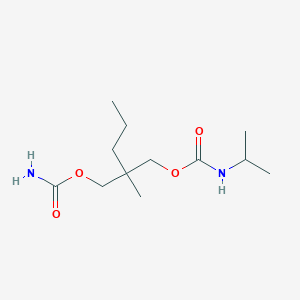Painful muscle spasm associated with musculoskeletal conditions
Adult: 250-350 mg tid and at bedtime for up to 2-3 weeks.
Child: ≥16 years Same as adult dose.
Child: ≥16 years Same as adult dose.
|
Indications and Dosage
Oral
Painful muscle spasm associated with musculoskeletal conditions Adult: 250-350 mg tid and at bedtime for up to 2-3 weeks.
Child: ≥16 years Same as adult dose. |
|
Special Patient Group
Pharmacogenomics:
CYP2C19 is the main enzyme responsible in carisoprodol metabolism to its active metabolite, meprobamate. CYP2C19 polymorphism may affect the pharmacokinetic response of carisoprodol. The prevalence of CYP2C19 poor metabolisers is markedly high in Asian (approx. 15-20%) than in Caucasians and African Americans (approx. 3-5%). Genetic testing for CYP2C19 may be considered as a guide prior to carisoprodol treatment initiation. CYP2C19 poor metabolisers (carriers of 2 no function alleles e.g. *2/*2, *2/*3,*3/*3) Patient with no CYP2C19 activity may have an increased risk of carisoprodol toxicity due to its narrow therapeutic index and should be used with caution. However, data are limited. Published studies indicate that poor metabolisers have a 4-fold increase in exposure to carisoprodol, and a concomitant 50% reduced exposure to meprobamate as compared to normal CYP2C19 metabolisers. |
|
Administration
May be taken with or without food.
|
|
Contraindications
Hypersensitivity. Acute intermittent porphyria.
|
|
Special Precautions
Patients with history of acute alcoholism or drug abuse and dependence, marked personality disorder. Not intended for long-term treatment (>3 weeks). Avoid abrupt withdrawal. Renal and hepatic impairment. Children. Pregnancy and lactation. CYP2C19 poor metabolisers.
|
|
Adverse Reactions
Significant: Dependence, hypersensitivity reactions (e.g. hyperpyrexia, chills, bronchospasm, Stevens-Johnson syndrome), withdrawal symptoms (e.g. tremors, myalgia, muscle twitching, insomnia), CNS depression, seizures, porphyria.
Blood and lymphatic system disorders: Rarely, leucopenia, pancytopenia. Cardiac disorders: Tachycardia. Gastrointestinal disorders: Nausea, vomiting, epigastric discomfort. General disorders and admin site conditions: Ataxia. Immune system disorders: Rarely, anaphylactic shock. Nervous system disorders: Drowsiness, dizziness, headache, vertigo, tremor, transient quadriplegia. Psychiatric disorders: Agitation, irritability, depressive reactions, insomnia, confusion. Respiratory, thoracic and mediastinal disorders: Rarely, bronchospasm. Vascular disorders: Postural hypotension, facial flushing, syncope. |
|
Patient Counseling Information
This drug may cause drowsiness or dizziness, if affected, do not drive or operate machinery.
|
|
Monitoring Parameters
Monitor for signs of CNS effects (e.g. mental status, excessive drowsiness) at the start of treatment and periodically thereafter; signs of misuse, abuse, or addiction.
|
|
Overdosage
Symptoms: Headache, blurred vision, mydriasis, nystagmus, muscular incoordination, rigidity, dystonic reactions, euphoria, hallucinations, delirium, hypotension, seizures, stupor, shock, serotonin syndrome, respiratory depression, and coma. Management: Symptomatic and supportive treatment. May consider performing gastric lavage within 1 hour of ingestion. Administer IV fluids and vasopressor agents if necessary for circulatory support. May administer IV benzodiazepines (e.g. diazepam) for initial seizures and phenobarbital for recurrent seizures. May consider tracheal intubation in case of severe CNS depression. May consider other successful measures in the treatment of meprobamate intoxication such as the use of activated charcoal, forced diuresis, peritoneal dialysis and haemodialysis.
|
|
Drug Interactions
May cause additive sedative effects with other CNS depressants (e.g. benzodiazepines, opioids, TCAs). May increase exposure of carisoprodol with CYP2C19 inhibitors (e.g. omeprazole, fluvoxamine). May decrease exposure of carisoprodol with CYP2C19 inducers (e.g. rifampicin, low dose aspirin).
|
|
Food Interaction
May enhance CNS depressant effects of alcohol. May increase serum concentration of meprobamate and decrease serum concentration of carisoprodol with St. John’s wort.
|
|
Action
Description:
Mechanism of Action: Carisoprodol is a centrally acting skeletal muscle relaxant. Its exact mechanism is not yet determined; however, it is known to block interneuronal activity and depresses the polysynaptic neuron transmission in spinal cord and descending reticular formation of the brain. It also has anxiolytic and sedative effects due to its active metabolite, meprobamate. Onset: Within 30 minutes. Duration: 4-6 hours. Pharmacokinetics: Absorption: Absorbed from the gastrointestinal tract. Time to peak plasma concentration: 1.5-2 hours. Distribution: Crosses placenta and enters breast milk. Plasma protein binding: <70% (carisoprodol); <25% (meprobamate). Metabolism: Metabolised in the liver mainly by CYP2C19 isoenzyme into its active metabolite, meprobamate. Excretion: Via urine (as metabolites). Elimination half-life: Approx 2 hours (carisoprodol); approx 10 hours (meprobamate). |
|
Chemical Structure
 Source: National Center for Biotechnology Information. PubChem Database. Carisoprodol, CID=2576, https://pubchem.ncbi.nlm.nih.gov/compound/Carisoprodol (accessed on Jan. 21, 2020) |
|
Storage
Store between 20-25°C.
|
|
MIMS Class
|
|
ATC Classification
M03BA02 - carisoprodol ; Belongs to the class of carbamic esters. Used as centrally-acting muscle relaxants.
|
|
References
Dean L. Carisoprodol Therapy and CYP2C19 Genotype. Medical Genetics Summaries [Internet]. Bethesda (MD): National Center for Biotechnology Information (US). 2017 Apr. Accessed 04/07/2019. PMID: 28520382 Annotation of FDA Label for Carisoprodol and CYP2C19. Pharmacogenomics Knowledgebase (PharmGKB). https://www.pharmgkb.org/. Accessed 04/07/2019. Anon. Carisoprodol. AHFS Clinical Drug Information [online]. Bethesda, MD. American Society of Health-System Pharmacists, Inc. https://www.ahfscdi.com. Accessed 04/07/2019. Anon. Carisoprodol. Lexicomp Online. Hudson, Ohio. Wolters Kluwer Clinical Drug Information, Inc. https://online.lexi.com. Accessed 04/07/2019. Buckingham R (ed). Carisoprodol. Martindale: The Complete Drug Reference [online]. London. Pharmaceutical Press. https://www.medicinescomplete.com. Accessed 04/07/2019. Carisoprodol Tablet (Actavis Pharma, Inc.). DailyMed. Source: U.S. National Library of Medicine. https://dailymed.nlm.nih.gov/dailymed/. Accessed 04/07/2019. Soma Tablets (Meda Pharmaceuticals Inc.). U.S. FDA. https://www.fda.gov/. Accessed 04/07/2019.
|